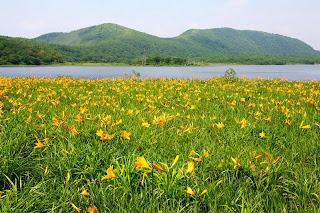Oguninuma Wetland in Fukushima.
雄国沼湿原
We were supposed to depart to Japan today (3/22).
Obviously that didn't happen for a number of reasons, not the least of which is the fact we can't exactly reach Fukushima to see my family. The bullet train service remains closed, the freeway is open to emergency vehicles only, and even if we were to brave the side roads, we wouldn't be able to buy gas. (Blast!) Oh, did I mention my family's home falls in the 50 miles evacuation area imposed by the U.S. Gov't?
I was lucky. My family's home remained intact (sans the stone fence that became a pile of rubble - see below), and everyone is alive and well. They even have running water now, after being out of it for a week.
Still, the situation at the Fukushima Daiichi nuclear power plant remains tense, and there is no end in sight for this plant fiasco. My brother's school became one of the evacuation sites for those who live close to the plant, so he is working there every day in lieu of his normal teaching job.
People in Fukushima seem to be remaining fairly calm, considering what they are going through. I hear there's mild panic in places like Tokyo, but since people in Fukushima don't have many choices, they are staying put, trying to continue or establish their everyday life (even at shelters). When they had to line up for water for 4 hours, my mom said everyone was smiling, chatting, and in general seemed content about it. She attributed it to Fukushimans' (←made-up word) laid-back disposition.
It's not exactly an urban area where my folks live, so usually there is a lot of driving. Since there is no gas available for purchase, they've been walking a lot (including going to get water when water was scarce). They are making the best of it, saying, "It's giving us a good exercise!" (Though they did need it.)
People have asked me, "Don't they want to get out?" "How about coming to Tokyo?" "Do they want to stay in Seattle for a while?" These are all reasonable questions to ask.
The answer is, no, they don't want to get out of Fukushima. Aside from the fact they can't physically get out on their own (no train, no road, no gas), even if they had the resources, they'd choose to stay there unless evacuation is absolutely necessary.
Fukushima is their home. My father and brother are looking forward to teaching when the schools finally open (maybe in May instead of April?); the kids would go back to school; my mom will be an official Fukushima flower guide volunteer (she trained months for it!) - and their life continues in Fukushima.
Life is in fact going right now - my sister-in-law realized the kids have had a week-long vacation inadvertently, so she's making them study at home. Come to think of it, since my family consists of teachers (my father, mother, brother, and sister-in-law), they could probably try to teach the curriculum if they so chose.
When I was talking to my mom about the lack of fuel, more than going to the store or getting around, what she cared about the most was: "I feel bad we couldn't pay a visit to the [family] grave." Amidst all this craziness, I had forgotten about Ohigan. My mother obviously didn't.
(For those of you outside Japan, the time surrounding the spring and fall equinox is called "Ohigan," which is a time to go to the family grave and honor your ancestors. In Japan, unless the grave is abandoned (because the family died off or something), the temple/cemetery doesn't keep up the headstone and its base structure that holds the clan's urns. The family does. Ohigan is one of the many times to do so. You go back home for it even if you live elsewhere.)
This really touched me. For my mom and many before her, Fukushima is *the* home, where they have Ohigan. They couldn't imagine leaving it. So I felt very silly to even bring up getting away from it.
People looking in from the outside may think, "Why would you want to stay there?" or "Why would you want to rebuild where it's dangerous/possibly radioactive?" I suspect most, if not all, of the people who evacuated from the area surrounding the power plant would want to go home if they could, and continue their lives. Because that is their home.
-A

Good thing they didn't have the car or one of the kids next to the fence!
車を塀の隣に停めてたり、子供が横にいなくて良かった〜。
実は今日(22日)、日本に一時帰国する予定でした。
当然ながら一番の目的は家族に会う事だったので、
新幹線、東北自動車道などなど使えない状態の今、
実家の福島に帰れない以上行く意味がありません。
普通の道をなんとか繋げて行くにしてもガソリンが
買えないのですからしょうがありません。
(八方塞がりとはこのことですね!笑)
家族が全員助かり、家も塀が崩れたのを除けば
ほとんどダメージがなかったので、
その点はとてもラッキーでした。
水も数日前に出るようになりましたし。
とは言え、福島第一原発では安心できない状況が
続き、完全な収束には時間がかかるでしょう。
兄の勤める高校は原発周辺の住民の方々の避難所となり、
普段の仕事の代わりにお手伝いをしているそうです。
母は福島の人はのんびりしているからだと言いますが、
この状況下でも、みんな意外に落ち着いているそうです。
東京などでは(特に、海外メディアから情報を得ている
人達は)「どうしよう逃げるべき?」と思案したり、
もう既に関西や海外に行ってしまった人達も
いるようですが、何しろ選択肢があまりない福島の人達は、
いるところが避難所であれ自分の家であれ、
今できるだけの「日常的」な生活をしようとしています。
先日、給水所で水をもらうのが4時間待ちだったときも、
みんなニコニコおしゃべりしながら待っていたそうです。
家族の住んでいるところはあまり人口密度が高くないので、
普段は車での移動が多くなります。
燃料が手に入らなかったので、水をもらいに行ったのも
もちろん徒歩ですが、「運動になって良かった!」とか
言っていました(運動はいいんだけど、待つのが寒そう)。
地震があって、原発がこんなことになってから、
いろいろな人に聞かれました。
「ご家族は疎開とか考えたのかな?」
「東京の親戚のところに身をよせるとか?」
「シアトルに来るっていうのはどう?」
どれも、もっともな質問です。
答えはどれも、「まさか〜」でした。
出たいと思っても出る手段がない、ということは
別にして、本当に危険で必要がない限り、
福島を出る事は考えていない、とのことです。
それは福島が家族の家で生活のベースだから。
父と兄は(5月になるのかいつになるやら)
学校が始まったら教鞭をとるし、
ボランティアがあるし、そして今ももちろん、
福島での生活は危機で止まっているのではなく、
続いているのです。
義理の姉は、ふっと気付いたら
一週間子供達が遊んで過ごしてしまったので、
勉強をさせ始めたそうです。←えらい。
(家族は全員教師なので、もしかしたら殆どの科目は
家でも学校のカリキュラムを教えられるかも!?)
昨夜、母とガソリンがないことを話していて、
彼女が不便を訴えたのは買い物のことでも
出かけることでもなく、
「ただ、お墓参りに行けなかったのが
悪かったんだけど」ということでした。
海外にいて忘れていましたが、
お彼岸だったのですね。
これには心を打たれました。
母や、福島にずっと暮らしてきた人達にとって、
福島はほんとうの「家」でありルーツなのです。
逃げ出す事なんて考えられないのも無理はありません。
それを、「シアトルに来られたら来たい?」などと
言った自分はとんでもなく浅はかでした。
外から見たら、「なんで危ない(かも知れない)のに
留まるの?」とか、「放射能が危険かも知れないのに、
またそこに帰るの?」とか思われるかもしれません。
でも、原発のまわりに住んでいて避難した人達も、
帰れるものならそこに帰って、また生活したいと
願っていると思います。
そこは彼等の家だから。
-英


